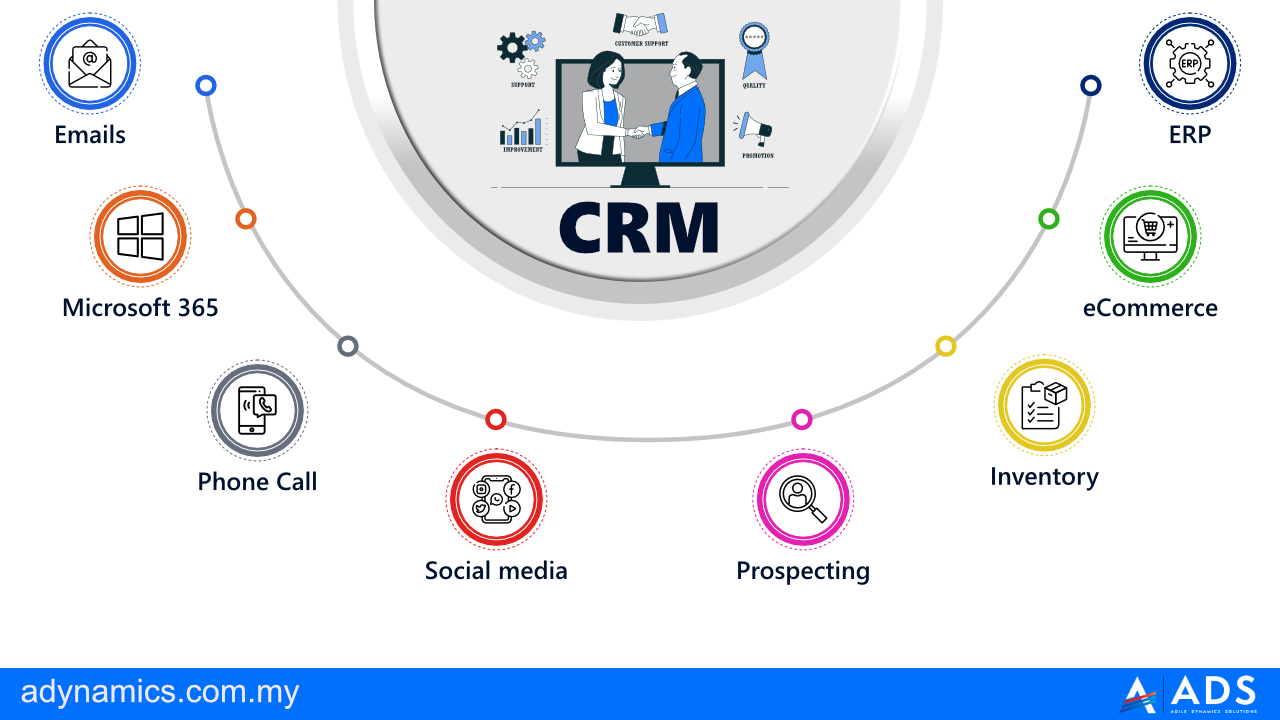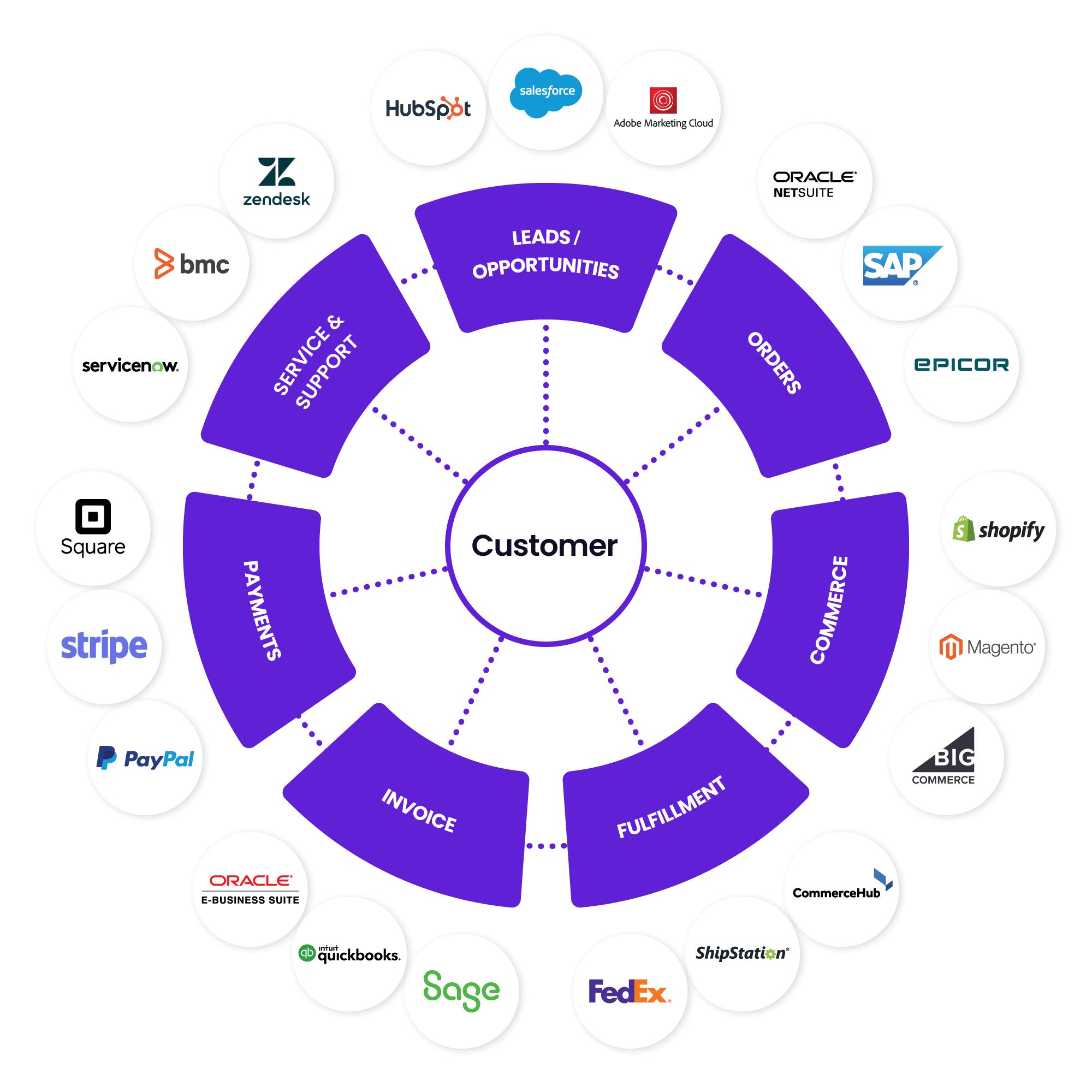Integrated CRM is transforming the way businesses manage customer relationships. By seamlessly connecting data and processes across multiple platforms, it empowers businesses to deliver exceptional customer experiences, streamline operations, and drive growth.
With a comprehensive suite of features and the ability to integrate with other business systems, integrated CRM offers a holistic approach to customer management, enabling businesses to gain a 360-degree view of their customers and make data-driven decisions.
Definition and Overview
Integrated customer relationship management (CRM) is a comprehensive approach to managing all aspects of customer interactions and data. It involves integrating various customer-facing functions, such as sales, marketing, customer service, and support, into a single, unified system.
An integrated CRM system provides a 360-degree view of the customer, enabling businesses to understand their needs, preferences, and behaviors better. This comprehensive view allows businesses to deliver personalized experiences, improve customer satisfaction, and drive growth.
Benefits and Advantages
Using an integrated CRM system offers numerous benefits and advantages, including:
- Improved customer experience:A unified system ensures consistency in customer interactions across all touchpoints, leading to enhanced customer satisfaction and loyalty.
- Increased sales and revenue:Integrated CRM systems provide valuable insights into customer behavior, enabling businesses to identify and target potential customers effectively.
- Enhanced marketing effectiveness:By tracking customer interactions and preferences, businesses can tailor marketing campaigns to specific customer segments, improving campaign performance.
- Improved customer service:Integrated CRM systems provide customer service representatives with a complete view of customer history and interactions, allowing them to resolve issues quickly and efficiently.
- Reduced costs:By automating tasks and streamlining processes, integrated CRM systems can help businesses reduce operational costs and improve efficiency.
Key Features of Integrated CRM
Integrated CRM systems offer a comprehensive suite of features that empower businesses to manage customer relationships effectively. These features enable businesses to capture, track, and analyze customer data, allowing them to gain a deeper understanding of their customers’ needs and preferences.
Core Features and Functionalities
The core features and functionalities of an integrated CRM system include:
- Customer Data Management:Captures and stores comprehensive customer data, including contact information, demographics, purchase history, and preferences.
- Sales Management:Automates and streamlines the sales process, from lead generation to order management.
- Marketing Automation:Provides tools for creating and executing targeted marketing campaigns.
- Customer Service Management:Facilitates efficient and personalized customer support through multiple channels.
- Reporting and Analytics:Generates insightful reports and dashboards that provide valuable insights into customer behavior and trends.
- Integration with Other Systems:Seamlessly integrates with other business systems, such as ERP and accounting software, to create a unified view of customer data.
These features work together to provide a comprehensive solution for managing customer relationships. By leveraging these capabilities, businesses can improve customer satisfaction, increase sales, and enhance operational efficiency.
Integration with Other Business Systems
Integrating CRM with other business systems, such as ERP, marketing automation, and e-commerce platforms, is crucial for businesses seeking to streamline operations and enhance customer experiences. By seamlessly connecting these systems, businesses can improve data flow, automate processes, and gain a holistic view of customer interactions across all channels.
Integrating CRM with ERP (Enterprise Resource Planning) systems allows for real-time data sharing between sales, finance, and operations departments. This eliminates data silos and ensures that all teams have access to the most up-to-date customer information, such as order history, billing details, and inventory levels.
Streamlined processes, such as automated order fulfillment and inventory management, result in improved efficiency and reduced errors.
Integrating CRM with marketing automation platforms enables businesses to create targeted marketing campaigns and nurture leads effectively. By sharing customer data and behavior from CRM, marketing teams can personalize email campaigns, track customer engagement, and measure the effectiveness of marketing initiatives.
This integration enhances customer engagement and increases conversion rates.
E-commerce platform integration with CRM allows businesses to track customer purchases, preferences, and browsing behavior. This data can be used to provide personalized recommendations, offer tailored promotions, and improve the overall shopping experience. Additionally, CRM integration facilitates seamless order processing, inventory management, and customer support, ensuring a consistent and positive customer journey.
Benefits of Integrated CRM for Different Industries

Integrated CRM systems offer a multitude of benefits that can significantly enhance business operations across various industries. By streamlining customer data, automating processes, and providing real-time insights, CRM systems empower organizations to improve customer satisfaction, increase sales, and gain a competitive edge.
Healthcare
The healthcare industry stands to gain immense benefits from implementing an integrated CRM system. By centralizing patient information, CRM systems improve care coordination, reduce medical errors, and enhance patient engagement. For instance, the University of Pittsburgh Medical Center (UPMC) implemented an integrated CRM system that streamlined patient data and improved communication between healthcare providers.
As a result, UPMC experienced a 20% increase in patient satisfaction and a 15% reduction in medical errors.
Manufacturing
In the manufacturing sector, integrated CRM systems play a crucial role in managing customer relationships throughout the product lifecycle. By tracking customer orders, preferences, and feedback, manufacturers can tailor their products and services to meet specific customer needs. For example, John Deere, a leading agricultural equipment manufacturer, implemented an integrated CRM system that enabled them to track customer usage patterns and identify opportunities for product improvement.
This resulted in a 10% increase in customer retention and a 5% increase in sales.
Financial Services
Integrated CRM systems are essential for financial institutions to manage customer relationships and provide personalized financial advice. By tracking customer financial profiles, transaction history, and risk tolerance, financial advisors can develop tailored investment plans and provide timely recommendations. For instance, Fidelity Investments implemented an integrated CRM system that allowed financial advisors to access customer data in real-time and provide personalized financial advice.
As a result, Fidelity experienced a 15% increase in customer satisfaction and a 10% increase in assets under management.
Retail
In the retail industry, integrated CRM systems help retailers understand customer behavior, personalize marketing campaigns, and improve customer loyalty. By tracking customer purchase history, preferences, and engagement data, retailers can tailor their promotions and offers to meet individual customer needs.
For example, Amazon, the e-commerce giant, implemented an integrated CRM system that allowed them to track customer browsing behavior and recommend personalized products. This resulted in a 20% increase in sales and a 15% increase in customer loyalty.
Education
Integrated CRM systems can significantly enhance the operations of educational institutions by streamlining student data management, improving communication with students and parents, and tracking student progress. For instance, the University of California, Berkeley implemented an integrated CRM system that allowed them to manage student applications, track academic progress, and provide personalized support services.
As a result, UC Berkeley experienced a 10% increase in student enrollment and a 15% increase in student retention.
Challenges and Considerations: Integrated Crm

Implementing and managing an integrated CRM system can bring numerous benefits, but it also presents potential challenges and considerations. Understanding these challenges and developing strategies to overcome them is crucial for successful adoption and sustained value realization.
Data Integration and Quality
- Integrating data from multiple sources can be complex and time-consuming, requiring careful planning and data mapping to ensure consistency and accuracy.
- Maintaining data quality is essential to ensure the reliability and usefulness of the CRM system. Establishing clear data governance policies and processes is vital to prevent data duplication, inconsistencies, and errors.
User Adoption and Training
- Resistance to change and lack of user buy-in can hinder the successful adoption of an integrated CRM system.
- Providing comprehensive training and ongoing support is crucial to ensure users understand the benefits and functionality of the system, promoting its effective utilization.
Cost and Resources, Integrated crm
- Implementing and maintaining an integrated CRM system can be a significant investment in terms of financial resources, requiring careful budgeting and prioritization.
- Organizations need to assess their resources, including personnel, expertise, and infrastructure, to ensure they have the capacity to support the implementation and ongoing management of the system.
Recommendations for Overcoming Challenges
- Develop a clear implementation plan that addresses data integration, data quality, and user adoption strategies.
- Establish a strong data governance framework to ensure data integrity and consistency.
- Invest in comprehensive training and ongoing support to maximize user adoption and proficiency.
- Secure adequate funding and resources to support the implementation and ongoing maintenance of the CRM system.
- Monitor and evaluate the system’s performance regularly to identify areas for improvement and ensure continued alignment with business objectives.
Trends and Future of Integrated CRM

Integrated CRM is constantly evolving, with new trends and innovations emerging to enhance customer experiences and drive business outcomes. Here are some key trends shaping the future of CRM:
- Artificial Intelligence (AI) and Machine Learning (ML):AI and ML are transforming CRM by automating tasks, providing personalized recommendations, and predicting customer behavior. This enables businesses to deliver more efficient and tailored customer experiences.
- Cloud-based CRM:Cloud-based CRM solutions are becoming increasingly popular due to their scalability, flexibility, and cost-effectiveness. They allow businesses to access their CRM data and applications from anywhere, at any time.
- Omnichannel Integration:Integrated CRM is expanding beyond traditional channels to encompass omnichannel capabilities. This allows businesses to provide seamless customer experiences across multiple channels, including social media, messaging apps, and self-service portals.
- Data Analytics and Customer Insights:Integrated CRM provides robust data analytics capabilities that enable businesses to gain valuable insights into customer behavior, preferences, and trends. This data can be used to improve decision-making, optimize marketing campaigns, and enhance customer experiences.
- Predictive Analytics:Predictive analytics is another emerging trend in integrated CRM. It uses advanced algorithms to predict future customer behavior, such as likelihood to purchase or churn. This information can help businesses proactively address customer needs and mitigate risks.
The future of CRM is bright, with continued innovation and advancements in technology. Integrated CRM will play a vital role in shaping customer experiences, driving business outcomes, and enabling businesses to stay competitive in the ever-changing digital landscape.
Closing Summary
As businesses navigate the evolving landscape of customer engagement, integrated CRM will continue to play a pivotal role. Its ability to foster personalized interactions, streamline processes, and drive innovation will empower businesses to build lasting customer relationships and achieve sustainable success.